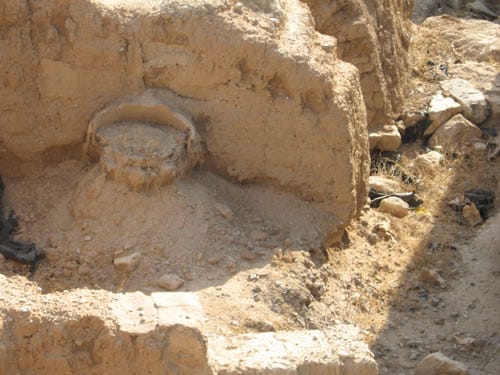But Joshua commanded the people, “You shall not shout or make your voice heard, neither shall any word go out of your mouth, until the day I tell you to shout. Then you shall shout” (ESV. Joshua 6:10).
Word was out. The Israelites had crossed the Jordan and headed to Jericho. The leaders didn't fear the multitude as much as they feared their God. From what they heard, the Israelites' God was more powerful than any they knew, and so, wanting to avoid a long battle with these people, they locked up the city and waited for the people to go away. The wall around the 8,000 year old city included a double wall, built 500 years before with the most revolutionary system: a glacis defense across the top of a stone wall built on a steeply sloped base. At 65 feet high, no one could scale the walls without being both seen and killed. If the gates were shut and barred, the people inside were safe, at least as long as their resources lasted. Hopefully these people would give up and move on before that happened.
The Israelites did not attack, but instead performed a strange ritual of walking around the walls. Soldiers and their priests led the march, blowing shofars, with the Ark of Covenant behind them. More soldiers followed. Before and behind with protectors, the Ark dominated the march. Stranger than the walk around the city was the silence of the men. The shofars blew incessantly, but no war cry or taunting escaped the lips of the men. They walked purposefully, but not threatening. Once each day for six days they strode in formation around the city and then returned quietly to their camps.
Tensions inside the walls increased. What were these people doing? They weren't trying to tunnel under the walls. They weren't building a siege ramp to go over the wall. They were just walking. And the Ark they carried--what was it and what was in it? Those within the city shouted to the marching men, but there was no reply. Just stony silence and steady walking. The warriors of Jericho had never seen such a display, and there was no making sense of it.
On the seventh day, something different. Six rotations around the city instead of one. Six loops with the Ark made the men shake. They felt a strange sense that they were about to learn more about this God. A seventh rotation. The air quivered. The shofar's short calls transformed into a long blast. The men's voices rose as one, a battle cry breaking their silence. Before the echoes finished, one final crash shattered the sky as the great walls collapsed outward, creating a ramp around the entire city. The armies of the Israelites surged over the ruins and destroyed everything and everyone in the city with fire.
The story of the walls of Jericho may be familiar to many (even Veggie Tales made a version), but there is so much to be learned here. In context, with the salvation of Rahab and the paired story of Achan's disobedience, the lesson of God's mercy and justice are clear. But that is for another day. The focus today is the silence before the crash.
Joshua knew that God had given Jericho to the Israelites. The method, however, was unconventional, and could not have made sense to the priests nor the warriors. Can you hear them saying, "Joshua, what do you mean walk around in silence for a week?" Whatever the case, Joshua led them to obedience, and God alone fulfilled His promise.
Sometimes God allows us to walk around a promise for a long time and without explanation. We dare not demand answers, nor should we complain about the process, whatever it is that God calls us to. He doesn't ask us to understand His ways (which is good, because we can't), but to trust in His love, mercy, grace, power, and truth. There are and there will be seasons of feeling like we are walking in circles, accomplishing nothing. But God is at work in us through our obedience (Philippians 2:13). His will is done and His good pleasure rests on us, even when we march around whatever walls we face in silence.
And then, when those walls tumble down and we enter into whatever He has for us, we will know that we had nothing to do with anything good; God makes the way according to His word and His will. His goodness is there, in the waiting, in the walking. This is the expression of our faith, conviction of things not seen, but confident in assurance that God keeps His promises (2 Corinthians 1:20; Hebrews 11:1). We don’t need to question or argue, although He offers mercy when we do. Keeping our focus on the Lord, returning to the Scriptures, praying, watching, and waiting without a word grants us space to see His work unfold—or explode in joy. The Israelites didn't know how God would bring victory over Jericho; they just knew He would. We may not know how God is going to bring us into victory either, but we know that He will. We just need to keep walking.

Resources:
The ESV Bible. English Standard Version, Crossway, 2001.
The Bible Project
"Design Patterns E2: Live from Milpitas." H2R Podcast, episode 14, H2R, https://d1bsmz3sdihplr.cloudfront.net/media/Podcast%20Transcripts/TBP%20Transcripts/H2R%20P14%20-%20Design%20Patterns%20E2%20-Live%20from%20Milpitas%20Transcript.pdf.
"Seventy Times Seven: Prophetic Math." The 7th Day Rest Podcast, episode 10, 7th Day Rest, https://d1bsmz3sdihplr.cloudfront.net/media/Podcast%20Transcripts/TBP%20Transcripts/7th%20Day%20Rest_E10_Seventy%20Times%20Seven%20-%20Prophetic%20Math%20Transcript.pdf.
Guzik, David. Bible Commentary: Joshua 6. Enduring Word, https://enduringword.com/bible-commentary/joshua-6/.
Tripp, Paul. “7 Gospel Promises to Embrace Today.” Paul Tripp, https://www.paultripp.com/articles/posts/7-gospel-promises-to-embrace-today.
"Wall of Jericho." The Civil Engineer, The International Information Center for Civil Engineers, www.thecivilengineer.org/education/online-historical-database-of-civil-infrastructure/wall-of-jericho.






Amen! Thank you for this.